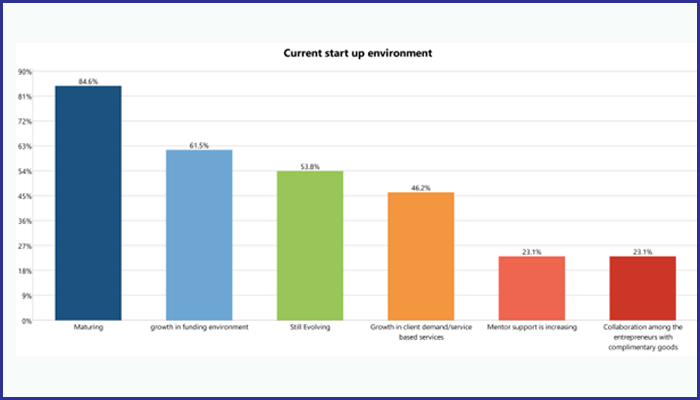A study conducted by IIITH’s deep tech incubator CIE reveals the impact of technology on its startups during the Covid-19 pandemic.
When the pandemic broke out in early 2020, it took a toll not just on the unorganised work sector but the formal workforce as well. Technology startups in particular which were riding a wave up until then found themselves at sea. In order to study the relevance and effects of technology on such deep tech startups, Anubhav Tiwari, Head of the deep tech and medtech incubator at Centre for Innovation & Entrepreneurship (CIE) at IIITH, set out to qualitatively analyse the challenges faced by the startups and document their responsiveness during the period. Based on a telephonic interview of 15 startup founders aged between 24 and 41 (13 of whom were CIE-based), the study highlighted the significance of the Technology Acceptance Model (TAM) for crisis management of startups.
In a Q&A that was conducted via e-mail, Anubhav Tiwari and Prof. Ritesh Dubey of XIM, Bhubaneswar, co-authors of the research paper, decode the study and explain what it means for budding entrepreneurs, as well as corporations and governments.


What were some of the pandemic-induced challenges faced by the startups and how did they overcome them?
In the initial days, the pandemic led to a disconnect in the startup ecosystem. Thus, a loss of mentorship and connection with various stakeholders were among the startups’ most significant challenges. Almost all startups faced difficulties pertaining to procurement of raw materials and resources, employee payment, logistics, banking, legal formalities, and finding suitable talent. Organizing and raising funds is always a challenge for startups, and the Covid-19 outbreak only compounded their challenges in raising funds, finding investors and partners.
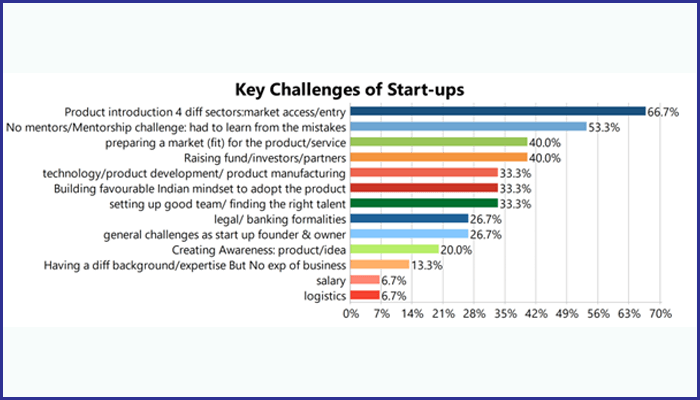
Some startups lost relevance for their existing ideas and products. So, they redesigned their products and services to suit the COVID-19 market. The startups invested a significant amount of R&D in digitalization, adoption of technology, understanding the consumers, and AI/ML-based projects. Preparing a market (fit) for the product/service, creating and launching a new value proposition product, building a favourable Indian mindset to adopt the product, and creating awareness has been a part of their coping mechanism to Covid-19. At CIE particularly, startups have learned the importance of constant transformation and renovation and experimentation of the product/ service to sustain the ever-changing market. For instance, an NLP-based startup observed a marked uptick in the sales of their automated speech technology. Similarly, another customized search engine-related startup reported that with people looking at online platforms and digitizing their lives with data, it only helped in spiking the potential for their product.
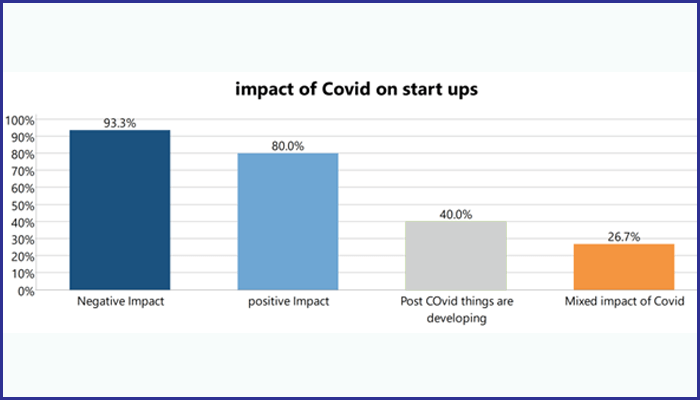
What is the Technology Acceptance Model (TAM) and what role did it play in the resilience demonstrated by the startups?
The TAM which was conceptualised by Fred Davis of MIT Sloan School of Management in 1985 has become a dominant model in investigating factors affecting users’ acceptance of the technology. The model presumes a mediating role of two variables called perceived ease of use and perceived usefulness concerning the intention to use and the potential or actual usage of a technology. At CIE, majority of startups are tech-based. Hence we found that we could observe the practical applications of TAM to cope with pandemic-like situations. A green energy based startup lay low for a while and restructured itself focusing on R&D in order to come up with a different product. In the case of a digital preventive healthcare startup again, necessity was the mother of invention. They took 14 days to come up with a novel remote monitoring solution for Covid-19 patients – something that would have ordinarily taken years. This shows the edge that a startup has thanks to its perceived usefulness and perceived use of technology coupled with the positive intent to use the technology itself. All this in turn led to the actual use of technology to solve challenges posed in a pandemic situation.
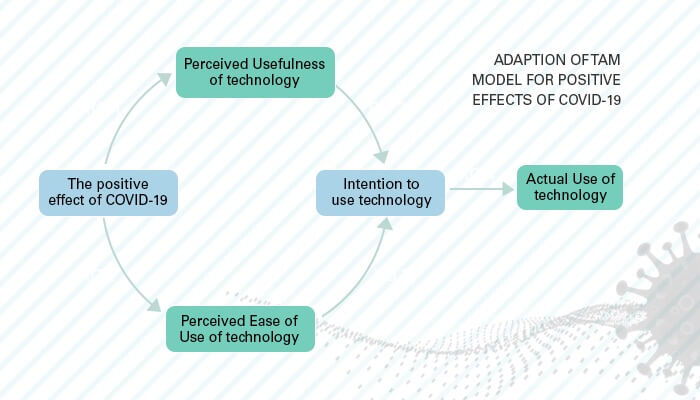 How did CIE’s incubator and accelerator help the startups?
How did CIE’s incubator and accelerator help the startups?
At CIE-IIITH startups benefited from Resilience Unlocked, Lockdown Talks, UNPITCH, COVID Hack and FireUp talks. These online series of initiatives helped start-ups surge over the lost momentum during the lockdown and lighten up the entrepreneurial spirit. UNPITCH was an unconventional event that aimed to help start-ups struggling with finances. It attracted 180 start-ups and 40 were shortlisted to pitch in the presence of 18 investors from Angel funds; VC firms and over 10 corporates. Start-ups like Sunfox, which is building a portable ECG machine; Urban Naps, which is building a smart napping pod were funded by IIITH through this initiative. Lockdown Talks is a string of 6 webinars and counting, involving investors, mentors and serial entrepreneurs on agendas like operations, market reach, and business development. CIE-IIITH slashed the incubation program fee to 50% for almost a year which gave a financial breather to the startups. COVID Hack, an accelerator program (a platform for Women Entrepreneurs and Women-led Enterprises with access to mentorship, deployment, technology support and up to Rs. 25 Lakhs Grant to fight back against COVID-19) in partnership with PRIF was conducted for women-led startups working on Covid-19 solutions.
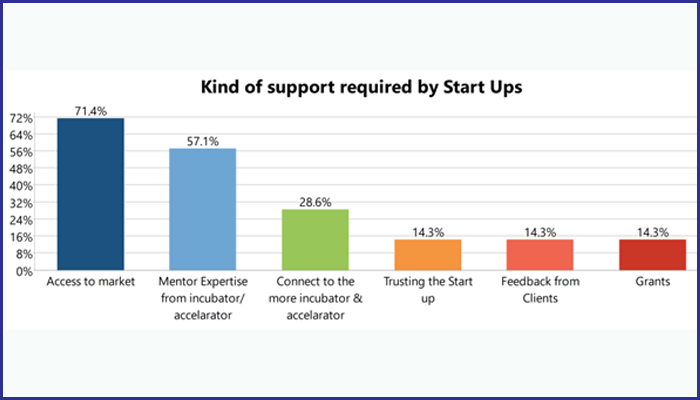
The impact of CIE’s support has been phenomenal. RayD8, one of the CIE-IIITH supported start-ups developed a triage and screening tool along with district level dashboard for Covid using AI. Empathy Design Labs developed a wearable and non-invasive screening patch – KRIYA™ for rapid pregnancy monitoring by expecting parents and clinical obstetricians. Nano Health created a tamper proof quarantine management and symptom management of Covid-19 positive patients in isolation centres of Indian Railways.
These examples are just the tip of the iceberg. It is evident from the journey of the selected 15 entrepreneurs in our study that young startups are quick at navigating through the marketplace shifts. Academic research has highlighted how the startups have innovated their way through tough times and contributed to the economy in shifting gears for growth across the globe. Therefore, it becomes imperative to support them by providing a conducive environment, mentoring, and support. Each startup in the study emphasized the crucial role the incubators and accelerators played in their journey towards making it big in the market.
What are the key takeaways of the study for other startups?
Overall we saw how R&D investments and investments in emerging technologies can lead to the transformation of a crisis into an opportunity. The findings reverberate with the vision of our Prime Minister Narendra Modi and are certainly a stride towards the creation of Atma Nirbhar Bharat. The results highlight the changed mindset of the customers and how customers have drastically accepted the use of technology and technology-based products and services. We also discovered the kind of support that the startups require. While it is obvious to assume that every startup requires funding and primarily focuses on budget, the surprising observation was that startups in the study focussed on access to the market and the need for mentorship. Founders believed that given the right mentorship and support from the incubator, they could do wonders for their stakeholders and expected to garner their trust. The biggest takeaway is perhaps that innovators and founders must understand the importance of TAM and how technology plays a crucial role in adapting to dynamic business and consumer needs.
